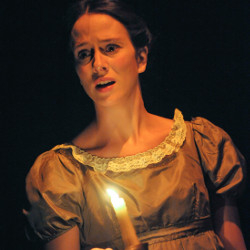Middlemarch – Dorothea's Story

© Robert Day
George Eliot’s nineteenth century novel of daunting length and some narrative complexity, “a study of provincial life” in the Midlands, is often considered the greatest of all English novels; a proposed movie by Sam Mendes has been in development for several years now.
So it’s a clever move of the Orange Tree to nip in sharply with a three-play adaptation by Geoffrey Beevers that promises to unravel the three main story-lines in a third-person framework, starting with Dorothea’s Story (The Doctor’s Story and Fred & Mary follow in November and December, with five trilogy days after Christmas).
Dorothea Brooke (a lovely, fully alive and alert performance by Georgina Strawson) is one of the great heroines of English fiction, comparable to Jane Austen’s Emma Woodhouse or Elizabeth Bennett, intelligent, compassionate, tragically deceived and self-sacrificing.
She marries a pedantic, blinking clergyman, Casaubon (Jamie Newall), and falls in love with his impoverished young cousin, Will Ladislaw (Ben Lambert) on honeymoon in Rome; meanwhile, her lively, open-hearted sister Celia (Daisy Ashford) marries her previously “intended,” a waggish landowner, Sir James Chettam (Christopher Naylor).
Beevers, directing with his associate, David Antrobus, has done a skilful job, not least in highlighting the delicious rhythmic and humorous style of Eliot’s prose, so that the playing of the ten actors, in that “sideways on” manner of the old Shared Experience shows and the RSC Nicholas Nickleby, dances in and out of the story.
They achieve the right lightness of touch for the intimacy of the square playing area, four stools at each corner for “seconds out:” Liz Crowther, for instance, can act like an arched eyebrow as the disapproving neighbour, Mrs Cadwallader, and swell a small crowd at the hustings (the Reform Bill of 1832 looms in the background) without changing gear; and Christopher Ettridge as the sisters’ wonderfully roguish and dyspeptic uncle can whip off his wig and become the sinister banker, Bulstrode, in a trice.
There is a slight problem in summarising a back story for Mr Lydgate (David Ricardo-Pearce), the idealistic doctor with his new wooden stethoscope, that hasn’t happened yet, and there’s an awkward promotion of Rosamond Vincy’s (Niamh Walsh) naughtiness that jars a little; but there are surprisingly few loose ends, and the play can be enjoyed for itself, though I fully intend to return for the other two.
The novel works anyway not so much in chronology as in layers. It’s almost twenty years since the BBC TV adaptation starring Juliet Aubrey and Rufus Sewell, so Middlemarch fans will need no second bidding to see a fresh new version that avoids all costume drama preciousness in the tensile cladding of Eliot’s prose and dialogue.










